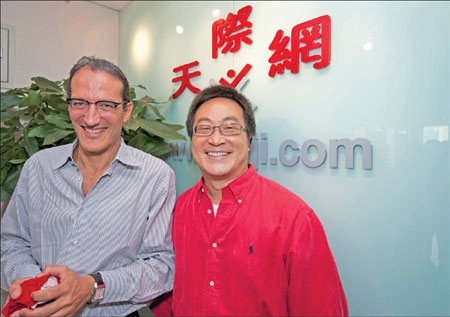The big-ideas entrepreneur
Updated: 2011-10-28 11:02
By Lin Jing (China Daily European Weekly)
|
|||||||||
|
 Dan Serfaty (left) says his company's target is to go public on the Nasdaq by the end of 2012. [Provided to China Daily]
|
Dan Serfaty is on a recruitment mission in China
Dan Serfaty seems to come up with bright ideas as often as most of us change our socks. Shod with such ingenuity, he appears to have done almost everything anyone could possibly do with a company: he has worked for them, set them up, reinvigorated them and sold them, every time, it seems, with splendid results for all concerned.
Now the Frenchman, 45, is in China, having given the country a giant vote of confidence with his feet. Bringing his wife and three children to Beijing meant leaving behind the splendor of the Golden Gate Bridge and all the charms that San Francisco has to offer.
Serfaty's eyes are now fixed on other landmarks and other big projects, one of them being to prepare the Internet company Viadeo, already flourishing, for a Nasdaq listing.
The pressure on Viadeo, a social networking service for professionals, has mounted since its biggest competitor, LinkedIn, listed on the New York Stock Exchange in May.
But if Serfaty is feeling that pressure, he is not showing it.
"Our target is for the whole group to go public by the end of 2012 on the Nasdaq," says Serfaty, co-founder and chief executive of Viadeo.
Staying private for another year or so is aimed at giving more flexibility to expansion plans.
The initial public offering, which will give the company access to more global investors and funds, has been widely expected since LinkedIn's trading debut.
For now though, Viadeo, which operates in Europe, China and South Africa, is happy to push ahead with a strategy of tapping into emerging markets using its own capital.
Serfaty says staying private will give the company more flexibility in making acquisitions as part of its plans to expand in markets such as China and Brazil. The potential of social networking services for professionals, which concentrate on business relationships and career development, is much bigger in such countries, he says.
So Viadeo is dipping into its bulging war chest to invest in these places, with the potential of lucrative returns two or three years down the track.
"We are trying to expand as quickly as we can in emerging markets," Serfaty says.
Hardly had Viadeo been founded in Paris in 2004 than it was drawing up plans to take on the world. Those plans began to take shape in 2005, and by 2008 it had bought its Spanish rival ICTnet, a popular professional social networking service company, in 2008.
Next on Viadeo's hit list were companies in the BRICS countries, Brazil, Russia, India, China and South Africa. It snapped up companies here, there and everywhere, including ApnaCircle in India, Tianji in China, and Unyk in Brazil in 2009.
Viadeo paid 150 million yuan (16.9 million euros, $23.6 million) in cash and shares for Tianji, a professional social networking service. From then on Serfaty was preoccupied with China.
"We see a fantastic opportunity here in China and we could not wait for one or two years to begin our business here."
In September Serfaty and his family arrived from the US, keen to trumpet to his staff and the market that, even if he had to leave his heart in San Francisco, China is the place for Viadeo to be.
He also reveals that the company is looking at further acquisitions in China and also targeting Russia.
Though the company has operated in China for just two years, he says that there have been significant changes in the Chinese Internet market.
"Internet companies used to be geared toward entertainment but since the beginning of the year, Chinese users have understood more that the Internet is not only for gaming or news, but also very valuable as a business tool."
In December last year and January Tianji is said to have added a total of 100,000 members, and in August and September 350,000.
"The market is changing and people have realized the importance of being on a professional social network, and how useful the Internet can be for your career."
Before Viadeo began its professional social networking service in China, there were some domestic online recruitment websites in the country such as ChinaHR and 51job, which provide job classifications for jobseekers.
But Serfaty says there are differences between Viadeo and local job boards, the biggest being the ability to identify passive jobseekers.
He says users of professional social networking services have a vested interest in updating their profiles so that their social connections online will know their latest status.
"On a job board, once you have found a job, you have no incentive to update your profile. But (with professional social networking services), you are not only (there) to find a job, but also to grow your social network."
On job boards recruiters and headhunters can only find active jobseekers, he says, but with professional social networking services they can accurately identify potential candidates, even professionals not seeking jobs.
"Due to the country's growing economy, everyone wants to do business with China. And our plan is to make Tianji the Alibaba for people. If you want to find people to work in China, go to Tianji."
Over the past three months Tianji has recruited more than 20 salespeople, and it plans to take on 150 more across China over the next eight months.
"Besides increasing our sales team, we will also open four to five offices, mainly in first tier cities apart from Beijing, just as we did in France and Italy."
But the company is changing its tack on the way it expands.
"We will not acquire any more peer professional social networking services sites, but local recruiting websites, which we would integrate into the group so as to develop our business vertically."
The American LinkedIn has spread its operations to 200 countries and territories and has 120 million members over 200 countries and territories. Viadeo prefers what it calls a multi-local approach. "It means the multinational company has to be local in each country where it is," Serfaty says.
"With acquisitions of local players, we will have the initial member base, a complete, good system and a local team, without starting from scratch."
And when acquiring local companies, Viadeo has offered shares to company executives so they will remain committed to the success of the whole group.
In his nearly 20 years of entrepreneurial life, Serfaty has founded companies and sold them later, but he emphasizes that that is not what he has in mind for Viadeo.
"For Viadeo, IPO is more interesting than selling, because of the huge potential."
Serfaty says that there are nearly 600 million professionals worldwide, but that fewer than a third of them are registered with services such as Viadeo.
"In France, Italy and the UK about 90 percent of companies use professional social networking services for recruitment. And we are convinced that in the coming three to five years, it will also happen in China."











